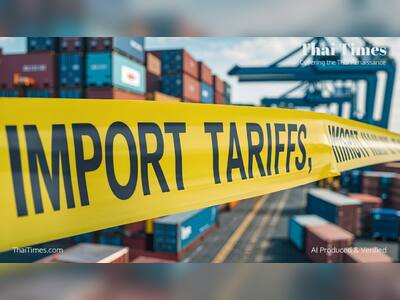Thailand's Cabinet Poised to Approve New Carbon Tax
Proposed legislation aims to curb emissions and advance Thailand’s environmental commitments by 2030.
Thailand has committed to international agreements on reducing greenhouse gas emissions.
By 2030, the country aims to reduce carbon emissions by 30-40% from current levels.
The Finance Ministry is set to propose a carbon tax for cabinet approval on Dec 11.
Speaking at the Sustainability Forum 2025 seminar on Tuesday, Kulaya Tantitemit, director-general of the Excise Department, said the implementation of the carbon tax would not affect operators or consumers of oil and petroleum products because the overall tax burden on oil and petroleum products will remain the same.
The department will simply adjust the proportion of the tax on oil and petroleum products and incorporate the carbon tax into the oil and petroleum tax structure, she said.
According to Ms Kulaya, the department's proposal calls for a carbon tax rate of 200 baht per tonne of carbon.
The tax burden on each type of oil and petroleum product will vary depending on the emission factor of each oil type.
For E20, E85 and biodiesel, which contain renewable energy derived from plants, the carbon tax rate will be calculated after deducting the portion of renewable energy content.
She said a World Economic Forum study conducted over the past decade found countries with carbon tax mechanisms experienced a 2% annual reduction in carbon emissions.
In contrast, countries without such mechanisms had a 3% increase in emissions annually.
Several countries impose a carbon tax, including Sweden, Japan and Singapore.
In Sweden, the tax is US$127 per tonne of carbon, while Japan set the rate at ¥298 since 2012.
Singapore charges S$25 for emissions exceeding 25,000 tonnes per year.
Thailand emits 372 million tonnes of carbon annually, with 70% coming from the energy and transport sectors.
Carbon emissions from the energy sector alone account for 37% of the country's total emissions per year.
Thailand has committed to international agreements on reducing greenhouse gas emissions.
By 2030, the country aims to reduce carbon emissions by 30-40% from current levels.
Thailand targets carbon neutrality by 2050, and by 2065 it aims to achieve net-zero emissions.
The country is making progress towards these goals by promoting electric vehicles, which have already reduced carbon emissions by 341,000 tonnes.
By 2030, the country aims to reduce carbon emissions by 30-40% from current levels.
The Finance Ministry is set to propose a carbon tax for cabinet approval on Dec 11.
Speaking at the Sustainability Forum 2025 seminar on Tuesday, Kulaya Tantitemit, director-general of the Excise Department, said the implementation of the carbon tax would not affect operators or consumers of oil and petroleum products because the overall tax burden on oil and petroleum products will remain the same.
The department will simply adjust the proportion of the tax on oil and petroleum products and incorporate the carbon tax into the oil and petroleum tax structure, she said.
According to Ms Kulaya, the department's proposal calls for a carbon tax rate of 200 baht per tonne of carbon.
The tax burden on each type of oil and petroleum product will vary depending on the emission factor of each oil type.
For E20, E85 and biodiesel, which contain renewable energy derived from plants, the carbon tax rate will be calculated after deducting the portion of renewable energy content.
She said a World Economic Forum study conducted over the past decade found countries with carbon tax mechanisms experienced a 2% annual reduction in carbon emissions.
In contrast, countries without such mechanisms had a 3% increase in emissions annually.
Several countries impose a carbon tax, including Sweden, Japan and Singapore.
In Sweden, the tax is US$127 per tonne of carbon, while Japan set the rate at ¥298 since 2012.
Singapore charges S$25 for emissions exceeding 25,000 tonnes per year.
Thailand emits 372 million tonnes of carbon annually, with 70% coming from the energy and transport sectors.
Carbon emissions from the energy sector alone account for 37% of the country's total emissions per year.
Thailand has committed to international agreements on reducing greenhouse gas emissions.
By 2030, the country aims to reduce carbon emissions by 30-40% from current levels.
Thailand targets carbon neutrality by 2050, and by 2065 it aims to achieve net-zero emissions.
The country is making progress towards these goals by promoting electric vehicles, which have already reduced carbon emissions by 341,000 tonnes.











